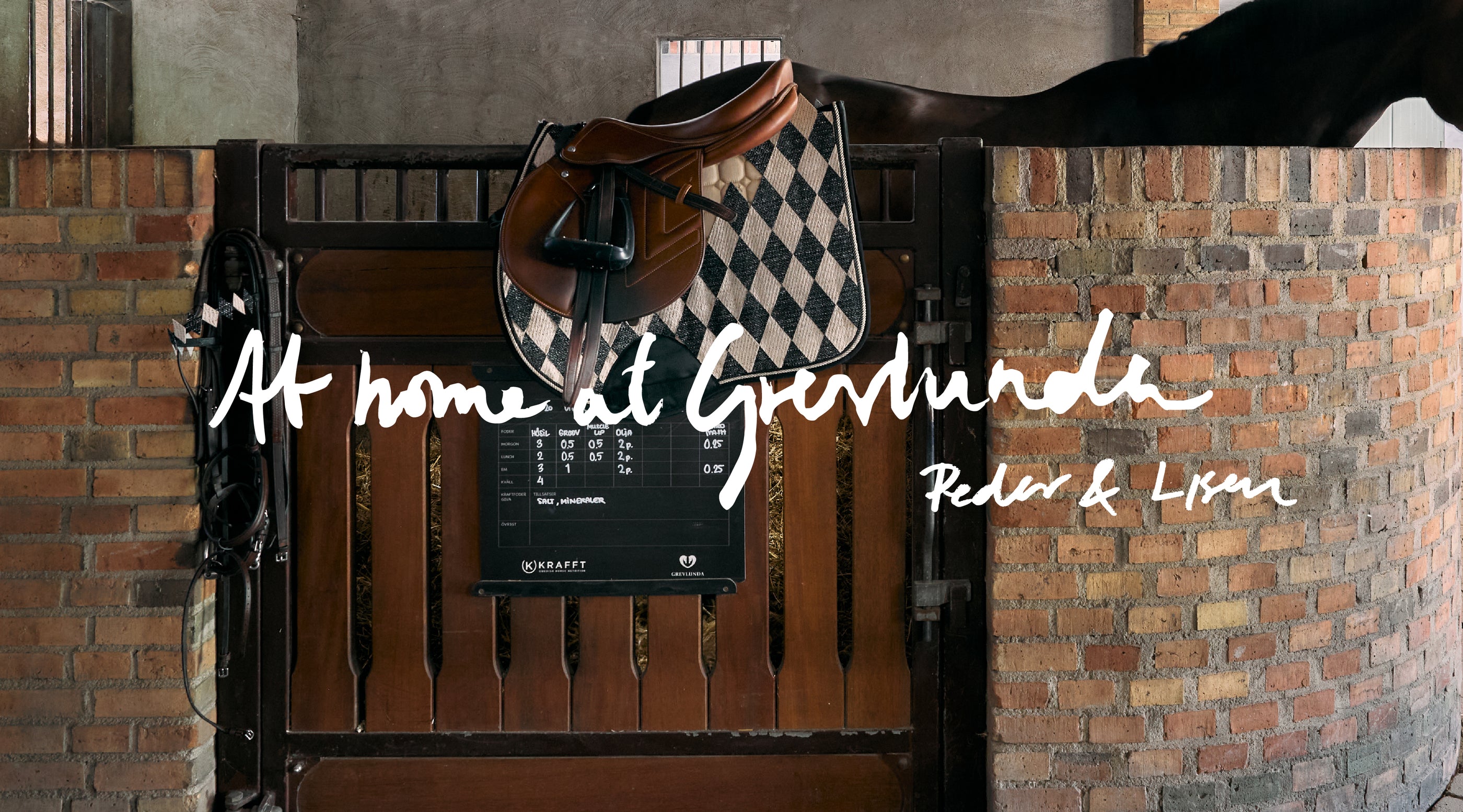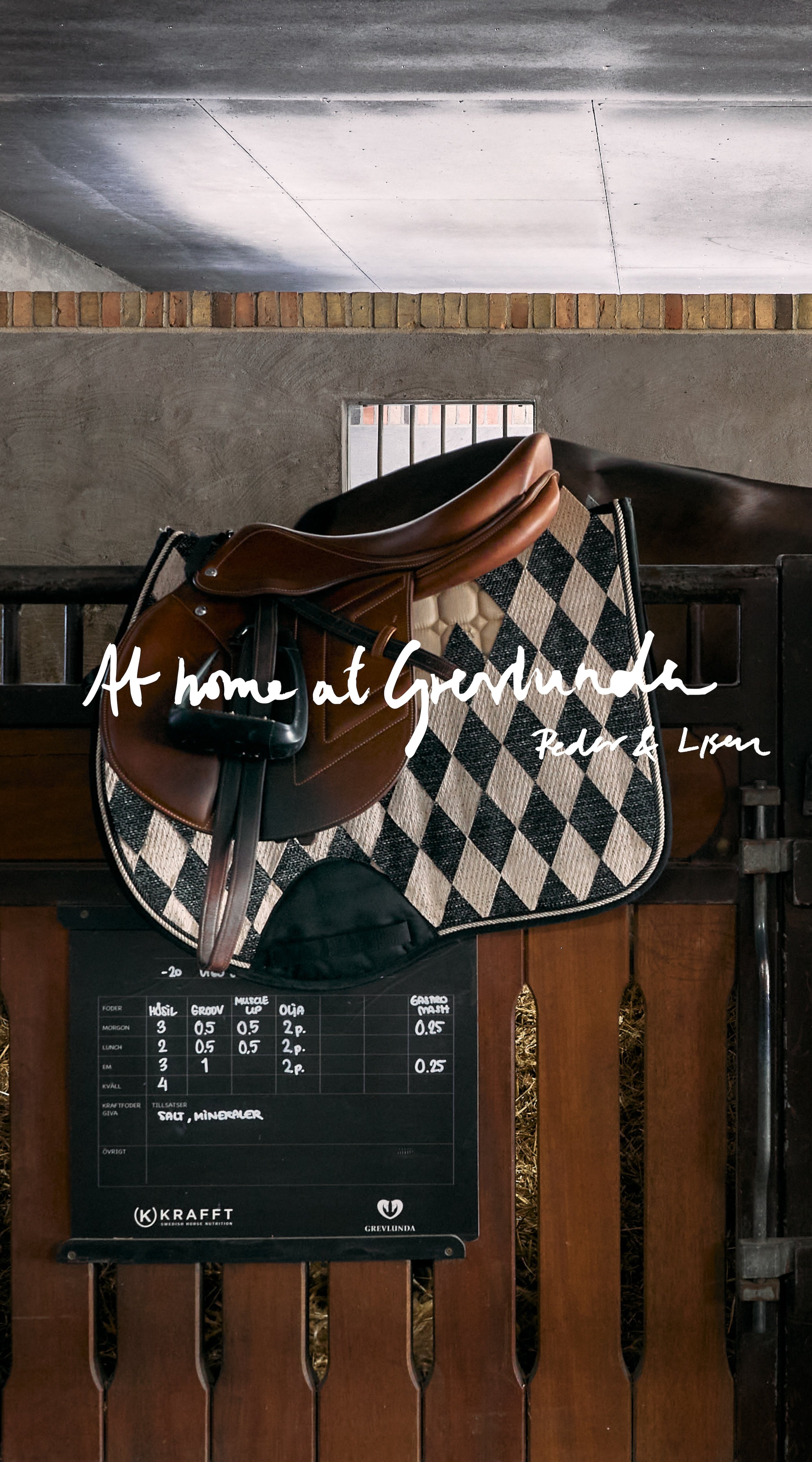We met Peder and Lisen Fredricson at their beautiful equestrian estate, Grevlunda. As one of the world’s leading showjumpers, Peder has earned Olympic gold and global acclaim, while Lisen has transformed her experience as a rider into a sharp entrepreneurial journey. Together, they have turned Grevlunda into a place where passion, quality, and creativity shape both life and sport.


Do you feel cut off from the world here?
Peder: No, not at all. We travel a lot. I think wherever you live, you rarely feel cut off. Often it’s only when visiting other places that you feel that way. When we lived in Flen, we thought that was isolated. Here it doesn’t feel that way – you always have your projects going on. Lisen: Yes, and we didn’t want to live where everyone else wants to – close to a motorway. We wanted the opposite.

But Grevlunda feels like more than just a stable. Can you tell us about your vision?
Lisen: We actually started the business together before we moved here, and the vision grew gradually. It wasn’t that we had a ten-year plan. It’s really the daily choices that made it what it is today. Today maybe it’s Sweden’s biggest showjumping stable. But 20 years ago we never set that as a goal.

So no ten-year plan?
Lisen: No, we’re very emotionally driven. Many want to know: what’s your plan, what’s next year? But it’s not like that for us.
Peder: No, we´re driven by passion.
Lisen: Exactly. It’s passion-driven. And it’s organic growth. That’s very us. Always quality before quantity. When we were younger, it felt frustrating that things went slowly, but now we see that was our strength. Even in how we keep our horses—together in paddocks, which wasn’t common then. That’s been the key.
Your whole philosophy with horses feels unique.
Peder: It was unique for 20 years, but now the rest of the world has caught up. Back then people thought we were crazy. But we loved it and believed in it.
Lisen, what was the turning point for you leaving riding?
Lisen: I’ve always liked “playing business.” Selling May flowers, shining shoes, role-playing hotels. Meeting with people. Later, competition gave me goals. But when I was pregnant with my first child and couldn’t ride, I thought: let’s start an auction business for horses. That was 21 years ago. Every pregnancy I started a new venture. At the same time, Peder was competing more, so it felt natural. People said I gave up my career, but it never felt that way.
Do you have a horse that has meant extra much to you?
Lisen: Yes, Casanova. Selling him allowed us to buy the farm. And Graal, a horse I’ll never forget riding.
Peder: For me, All In.
Linn: Everyone knows All In. He’s not just a horse anymore – statue, documentary, clothing line...
Okay, let’s talk about the house. Who decides the interior?
Lisen: We discuss together, but I usually decide.
Peder: And I carry things around. I have more to say about the outdoor environment –hedges, trees. I’ve planted everything here over 20 years ago, every lilac hedge, every tree.

And you’ve filled the house with furniture from travels. Do you have a favorite piece?
Lisen: One fun story: when Peder won a car in Buenos Aires. We couldn’t bring it home, so we sold it and bought antique furniture at an auction instead, and shipped it home. That’s how we got many of our first pieces.
Peder: And I also have heirlooms – a walnut cabinet from my godmother, a mirror from my parents. It’s important to love the things you live with.
Lisen: Yes, we don’t want to live in a museum, but we want to be a little in love with our things.
Do you ever regret a purchase?
Lisen: We have the world’s ugliest massage chair. Hideous but so comfortable.
Peder: Our son uses it constantly.
Lisen: Also some office chairs – comfortable but ugly.
What made you fall for the Balls furniture?
Lisen: The first time I saw it I thought: how cool! It’s playful, almost childlike, yet like art. Stylish but with a twist. It excites you. And at home, mixing it with inherited antiques feels perfect. I also like the glossy finish – it adds that sparkle.
Peder: Yes, we like things that break the pattern, that make something happen.

We also heard, Peder, that you trained as a graphic designer. How does creativity play into your life today?
Peder: I don’t use it a lot now, but I’m picky about function and design. I used to work half as a graphic designer and half as a rider before All In. And I’ve always liked sculpting as a hobby.
Can you tell us something about each other that no one knows?
Lisen: Peder loves baths. He can lie in the tub for two hours every day. He even books hotels based on bathtubs.
Peder: If she hadn’t been an entrepreneur, she would have been a crime scene investigator. She loves details, mysteries, solving things.

Where do you see yourselves in ten years?
Peder: We never plan that far ahead. We live passion-driven lives. If one day our lives feel no fun anymore we’ll do something else.
Lisen: Maybe more time for creativity, painting, things like that.

Thank you Peder and Lisen!






